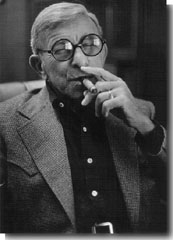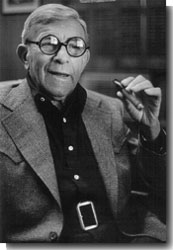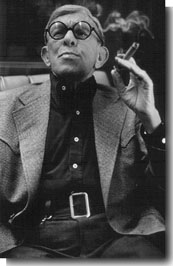

"I did mess around when I was married to Gracie. Look, nobody is a. . . . I don't care if you were married to Marilyn Monroe. If you were married to her, you'd cheat with some ugly girl."

"I sang a French song, 'La Vie en Rose,' for Jackie Kennedy in the White House. She told me she'd been speaking French all her life, but after hearing me, realized she'd been doing it all wrong."

"What do I think of the new comics? You mean all the kids that are coming up like Milton Berle, Alan King, Buddy Hackett? Those kids will all make it. The kids today, you can't stop 'em."
The most inspired cinematic stroke of 1977 was the casting of George Burns as God in Warner Bros.' huge money-maker "Oh, God!" And, by God, there may be a Second Coming of Burns's tennis-shoed Lord in a sequel. Playing God isn't bad for a performer who readily admits that he was a god-awful vaudevillian until he teamed up with a dainty Irish dramatic actress and dancer named Gracie Allen. To hear Burns tell it, in his self-deprecatory manner, he went into retirement the moment he hooked up with Amazing Gracie. "Gracie did it all," he says. "All I had to do was smoke a cigar and ask, 'Gracie, how's your brother?'"
George's slow-burning interlocutor was the perfect foil for the loopy Gracie. As the harassed husband, he wielded his cigar as if it were an S O S flare and delivered gravelly voiced asides with impeccable timing. For more than three decades--in vaudeville, then on radio and television--Burns and Allen were America's most beloved odd couple. Preferring to spend more time with her grandchildren, Gracie retired in 1958. So, slightly daunted, George decided to continue as a single. His fears of flopping were without foundation. He quickly became a Las Vegas headliner, a sought-after talk-show guest and, finally, a bonafide movie star who won an Oscar for his performance in "The Sunshine Boys," the first movie in which he played a character other than himself.
Burns contends he was born Nathan Birnbaum 82 years ago on Pitt Street in New York's Lower East Side. That is hotly disputed by some of his friends, who insist George is merely 45 but plays old in order to score more easily with the nubile starlets with whom he's so often seen. The ninth of 12 children, Burns never realized how poor his family was, "because everybody I knew was poor and, anyway, we always had enough hot food to eat . . . my mother made a great sauce . . . with her sauce, anything would taste good, even a shoe." Besides an enduring obsession for napalm-hot food, George also inherited his mother's sense of humor. "She was funny by inference, like I am," he says. "She had a great sense of humor." Except at choosing a husband, a dour, Orthodox Jew who was a factotum around the synagogue and who died when George was seven.
By the time he was 14, Burns was a dance teacher and fledgling vaudevillian who would do damn near anything to get six minutes onstage--roller-skate, sand dance, even play second banana to a trained seal. He kept that up for 13 years. Enter--providentially--Gracie Allen, a 17-year-old out-of-work dancer-actress who caught George's act one night in 1923, felt the poor lad needed some help and went backstage to suggest they team up.
At first, George was the comic and Gracie played it straight; but when Gracie got all the laughs, Burns decided on a droll reversal. Not much later, Gracie pulled a switcheroo of her own. At the time she teamed up with George, she was in love with a handsome Irish vaudevillian named Benny Ryan. Stricken with appendicitis in San Francisco while touring with Burns, Gracie waited in vain for some sympathetic word from Ryan. What she got was $160 worth of flowers from George. Exit Benny Ryan. George and Gracie were married in 1926.
That same year, Burns and Allen were signed to a six-year contract by the prestigious B. F. Keith vaudeville chain and they soon climbed to the top of the hill with such material as the celebrated "Lamb Chops" routine:
GEORGE: Do you like to love?
GRACIE: No.
GEORGE: Do you like to kiss?
GRACIE: No.
GEORGE: What do you like?
GRACIE: Lamb chops.
GEORGE: A girl like you, a little girl like you, can you eat two lamb chops alone?
GRACIE: Alone I can't eat them. With potatoes I can eat them.
Though, as Burns now admits, that bit of business is pretty silly, "Lamb Chops" served as the centerpiece--and title--for their first movie, a nine-minute Vitaphone one-reeler in 1929. Gracie's off-center "illogical logic" made exquisite sense to a nation that had not yet turned cynical and for which fun was still simply fun. George and Gracie soon found themselves in demand as guest performers on hit radio shows hosted by the likes of Eddie Cantor, Rudy Vallee and Guy Lombardo, and in 1932 they quit vaudeville for their own CBS radio show. George's unfinished melodies and Gracie's non sequiturs were fixtures on the airwaves for the next 18 years.
In 1950, Burns and Allen made the transition to television with a situation comedy featuring Bea Benadaret, Larry Keating and Harry Von Zell. The show ran--usually near the top of the ratings--until Gracie retired. Like Jack Benny's and Groucho Marx's, the Burns and Allen show had a timeless quality about it and you can bet your life that reruns are being televised somewhere in the U.S. right now.
Burns continued on TV alone for a year as star of "The George Burns Show"; then he did a season with Connie Stevens in the series "Wendy and Me," which he also produced. He became a wealthy man: With Gracie, he owned the $5,000,000 McCadden Corporation, which produced not only "The Burns and Allen Show" but "The Bob Cummings Show," "The People's Choice" and "Panic!" Burns also was co-owner of the talking-horse TV series "Mr. Ed."
Then, convinced that "some of Gracie's talent had rubbed off on me," the 63-year-old Burns became one of the freshest new faces of 1959 when he launched his solo night-club and concert act. The act, which consisted of songs never sung to completion and monologs about life with Gracie punctuated by puffs on a huge El Producto, was boffo everywhere. After Gracie's death in 1964, Burns teamed up for a time with bubble-headed blonde Carol Channing, then went into the first of many periods of semiretirement.
Burns very nearly died himself before undergoing open-heart surgery in August 1974. One of the most constant visitors during George's recuperation was his closest friend, Jack Benny, who had just agreed to co-star in the film version of Neil Simon's hit play about two aged, feuding ex-vaudevillians, "The Sunshine Boys." Burns recovered completely, but Benny died suddenly--and playwright Simon and director Herbert Ross asked Burns to replace him in the cast. Acting opposite Walter Matthau, Burns played the part of Al Lewis with such stylish charm and dignity that no one was surprised when he won the Oscar for Best Supporting Actor of 1975. He won further plaudits for 1977's "Oh, God!" and has just completed work on the $12,000,000 musical "Sgt. Pepper's Lonely Hearts Club Band," based on the Beatles' album and starring Peter Frampton and the Bee Gees. Several other scripts await his perusal.
To find out how Burns is coping with his second experience with stardom, Playboy sent writer Arthur Cooper to interview him. He reports: "George Burns is your typical overnight success. He lives in a large, expensively appointed house at one of the country's most fashionable addresses, in Beverly Hills. He wears modish, finely tailored suits and sports coats and colorful turtleneck sweaters. He dines at the trendiest restaurants and is invited to all the chichi parties. He can usually be found behind a blue cloud of cigar smoke and on the arm of some curvaceous young beauty. He tools around town in a new dark-blue Cadillac Seville.
"In truth, Burns is one of the gentlest and kindest of men. Even when prodded, he cannot find a mean word to say about anyone. If he ever had any enemies, he has managed to outlive them. He is considerate to the point of using a plastic cigar holder to spare those around him the sight of the wet tip of his cigar.
"The interview took place over the period of a week, both at Burns's house and on the location of ' Sgt. Pepper's Lonely Hearts Club Band,' the musical in which he has the only speaking part. On the set between takes, sitting in a canvas chair with his name lettered on the back, George was besieged for autographs. Women, young and old, lined up to pose with Burns while friends clicked away on Instamatics. Women simply can't keep their hands off George--and vice versa.
"He is an informal fellow, a charming raconteur, a dignified relic who, ironically enough, has never known greater fame. And, so you shouldn't be surprised, Burns serves the driest martinis--and the hottest soup--in Southern California."
PLAYBOY: Do you have any idea how many times you've been interviewed?
BURNS: More than once. If you want a good interview, you have to ask the right questions. If I'm sparked, I can talk for days. The questions that drive me nuts are when somebody says, "What's the funniest thing you ever said?" "Who is the funniest man you ever met?" "Say something funny." It's ridiculous. Your question was pretty ridiculous, too. You want a cigar?
PLAYBOY: No, thanks.
BURNS: That's the only excitement I get these days--putting a cigar in the holder.
PLAYBOY: The editors said they wanted this interview to be revealing as well as funny. Anything you'd care to reveal at the outset?
BURNS: I lust for chicken soup.
PLAYBOY: Actually, from what we hear, it's the young women around Los Angeles who lust after you . Why do so many of them find you irresistible?

|
Updated 10 Oct 24 |